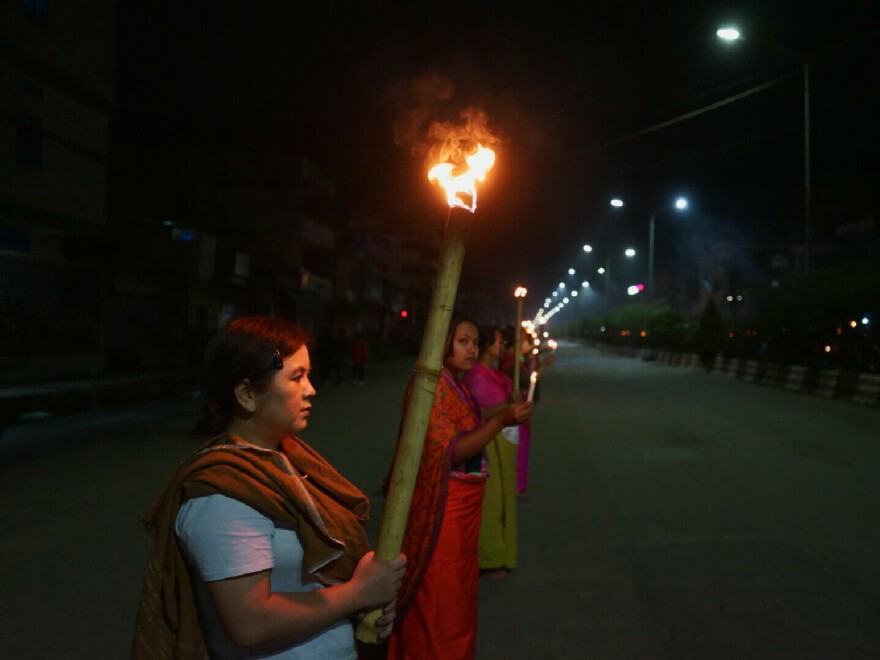IMPHAL, India — In India's northeastern state of Manipur, a months-long ethnic clash has turned into a political battleground. Rahul Gandhi, India's main opposition leader, who was on a two-day visit to the region last week, said he was pained to see the situation and people suffering.
"I came here because I wanted to share the pain of the people of Manipur. It is a horrible tragedy that has taken place," the Congress party leader said on Friday.
Around 130 people have died in the ethnic violence between two communities in Manipur, which shares a border with Myanmar, close to China. Homes of hundreds of families, shops, churches and other buildings have been burned by angry mobs since the violence began in early May.
The Indian government has called in thousands of additional armed forces to handle the situation. Indian Army soldiers involved in securing the contentious border with neighboring China have also been deployed in and around the main city of Imphal.
Clashes broke out between the minority Kuki and majority Maeitei community following a court ruling that gave Meiteis a "tribal status" that provides them with new economic benefits and quotas in government jobs and education. The order drew sharp reactions, triggering pitched battles between the two communities.

Every day, incidents of violence are reported from the region. Three people and a police personnel were killed during clashes on Thursday as Gandhi was visiting the state.
Thousands of people have been displaced by the regular attacks from armed men. Some of the villages have been completely razed to the ground. People from both communities have fled to secure locations or makeshift refugee camps.
Sofia Nongmaithem is a 22-year-old student who fled with her family during an attack and is now living in a girls hostel, which has been turned into a refugee camp.
As she was escaping, she said, she looked at her home engulfed in flames.
"We never thought of this. The attack on us was properly planned," she said. "Unless and until the conflict is ended by the government, I think we will have to stay like this."
Gandhi has asked the government to help the people who have been displaced by the violence.
"I went to the (relief) camps and met people of all communities. One of the things I would say to the government is that the basic amenities at the camps need to be improved. Food needs to be improved, medicines need to be supplied," Gandhi told a reporter as he was leaving for New Delhi from Manipur on Friday.
Gandhi has also made appeals for peace and cessation of hostilities on both sides.
"My strong appeal to everybody is that violence will not get anything for anybody. Peace is the way forward and everybody should now talk about peace and start moving towards peace. I am here to help in any way I can to bring peace to the state," Gandhi said.

There have also been attempts by the people living in Manipur to bring peace to the region. Women have been organizing peace marches and calling for an end to the violence.
College professor Hanthenam Anita Devi, 40, was part of a similar peace march recently.
"We have come out today along with all these women to show our solidarity that we want peace and we want certain actions to be taken," she said. "[Manipur] is called mini India because almost 35 communities have been residing here for so many years and there has been no issue and suddenly violence has come up."
In Imphal, an angry mob of men and women looted hundreds of weapons from a police armory in the initial days of the violence. The police and security forces have yet to recover most of the missing weapons. Many police officers have been disarmed to thwart incidents of weapon snatching. Manipur is now divided between two sides. Meiteis in the valley and Kukis in the hills. Each side defends its own territory with civilian defense volunteer groups.
"We have been guarding our area since the violence started. This is our duty. We use our ... guns to defend our areas. Our houses and villages have been burned down," said Hemkholien, a 47-year-old defense volunteer. "The attacks on us continue from the other side. We are only fighting back. We will have to continue this fight until the peace returns and until our demand for a separate administration is met."

The local government earlier said that schools in the region will be opened, but due to the fresh violence, the government has ordered all schools to remain shut until July 8. Internet services have also been shut off for the last two months.
The violence in Manipur, which recovered from a deadly insurgency only around two decades ago, has put northeast India on edge. There is fear that violence may spill over, like in the past in neighbouring states.
The government of Prime Minister Narendra Modi, which also controls the local government in the state, has been accused of not doing enough to bring peace in the region. The government is at the center of anger from both sides and peace remains elusive.
Modi has so far remained silent over the issue, but a senior leader in his Bharatiya Janata Party and the chief minister of neighboring Assam state, Himanta Biswa Sarma, said Saturday that the situation in Manipur was improving. "The situation is fast becoming normal," he told reporters.
Copyright 2023 NPR. To see more, visit https://www.npr.org.



